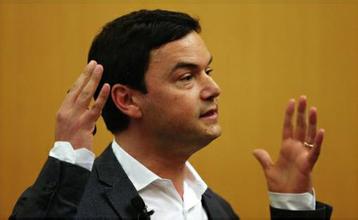(单词翻译:单击)
If you want to measure the capital possessed by a nation, there are two ways of doing it. One is to travel the length and breadth of the country counting the houses, the bridges, the factories, shops and offices, and adding up their total value. The other is to knock on doors and ask people how rich they are. National statistics offices typically do both of these things, though not literally in this way.
如果你要估算一个国家所拥有的资本,有两种方式。一种是走遍全国各地,清点房屋、桥梁、工厂、商店和办公楼的数量,然后加总计算它们的价值。另一种是敲开门,询问人们的财产情况。国家统计部门通常两种方式都用,尽管不是照此字面上那样做。

The totals should be roughly equivalent, because however complex the chain of intermediation, it is the nation’s savings which fund the nation’s investment. The totals are not, however, exactly the same – for a few reasons.
两种方式得到的总数应该大致相当,因为无论中间环节多么复杂,一国的投资总归是来自该国的储蓄。然而,基于一些原因,总数又不会完全相同。
For example, some national assets are owned by foreigners, and some household wealth is held overseas. But for large, developed countries the net effect of this is small because the two factors balance. The value of overseas assets owned by residents of Britain and of France is almost the same, in total, as the value of domestic assets held by overseas residents. Germany owns more than it owes, but the reverse is true of the US.
例如,一些国家资产被外国人持有,而本国居民在境外也拥有家庭财富。但对于大的发达国家而言,其最终影响很小,因为这两个因素可以相互抵消。英国和法国居民所拥有的海外资产价值,总体上与境外居民持有的两国国内资产的价值几乎相当。德国拥有的境外资产比别国拥有的德国境内资产多,而美国恰恰相反。
In addition, we do not treat government assets as part of our personal wealth, even if we attach value to the road network and the national gallery (and we certainly should). If, directly or indirectly, we hold government debt, we treat it as an asset, even though the future taxpayers who will have to pay it back do not report it as a liability.
此外,即使我们重视道路网和国家美术馆(当然应该),我们也不会把政府资产当作个人财富的一部分。如果我们直接或间接持有国债,我们把它看作一种资产,即使是未来需要为此偿债的纳税人并不把它报告为债务。
Finally, some of what we regard as household wealth is a claim on future earnings. Apple has a market capitalisation of more than $500bn, but the corporation owns physical assets worth only about $15bn (and a $150bn mountain of cash). The bulk of the corporation’s value is anticipation of future profits. Similarly, pension rights are an important component of household wealth that may – or may not – be backed up by actual investments.
最后,一些我们认为的家庭财富其实是对未来收益的主张。苹果公司(Apple)的市值超过了5000亿美元,但该公司的实物资产价值仅为约150亿美元(还有1500亿美元的巨量现金)。该公司价值的一大部分是对未来利润的预期。类似地,养老金也是家庭财富的重要组成部分,但养老金可能得到实际投资的支持,也可能得不到。
So there are two different concepts of national capital: physical assets and household wealth. Thomas Piketty’s widely cited study measures national capital using data derived from the UN system of statistical accounts (the only source that provides internationally comparable information). Professor Piketty has heroically attempted to reconstruct estimates for extended historical periods for Britain and France – to estimate what Lord Liverpool, Wellington’s prime minister, and Napoleon’s statisticians would have told their masters if they had appropriate data and knowledge of the UN system of accounts.
因此就有了两种不同的国家资本概念:实物资产和家庭财富。托马斯•皮凯蒂(Thomas Piketty)利用从联合国(UN)统计账户系统(提供具有国际可比性信息的唯一来源)获得的数据来估算国家资本。他的研究被广泛引用。皮凯蒂教授勇敢地尝试重估英国和法国在很长历史时期内的国家资本——估算出如果那时候的统计师可以得到适当的数据并了解联合国账户系统的话,他们会如何向自己的主人利物浦勋爵(Lord Liverpool)、惠灵顿公爵(Duke of Wellington)以及拿破仑(Napoleon)汇报。
Prof Piketty’s figures are closer to the first concept (physical assets) than to the second (household wealth). But for his principal purposes – a review of inequality – it would seem that household wealth is more relevant. The wealth of Carlos Slim, Bill Gates or Warren Buffett is largely outside his data because the market value of América Móvil, Microsoft and Berkshire Hathaway far exceeds the tangible assets of these companies. And while the scale of these individuals’ wealth is unrepresentative even among the rich of today, they are wholly representative in the sources of their wealth.
皮凯蒂教授得到的数字更接近第一个概念(实物资产),而非第二个(家庭财富)。但既然他的主要目的是评估不平等,似乎家庭财富才与之更具相关性。卡洛斯•斯利姆(Carlos Slim)、比尔•盖茨(Bill Gates)或者沃伦•巴菲特(Warren Buffett)的财富很大程度上并不包括在他的数据之内,因为美洲电信公司(América Móvil)、微软(Microsoft)和伯克希尔-哈撒韦公司(Berkshire Hathaway)的市值都远远超过了公司的有形资产。虽然论规模,这些个人的财富即使在当今的富人中也不具有代表性,但他们在财富来源上完全具有典型性。
If “capital is back”, as Prof Piketty contends, it is in a very different sense from the 19th-century view, in which the ownership of capital confers authority over the means of production. Messrs Slim, Gates and Buffett do control the means of production but not in the way described by Marx. They did not acquire control of the means of production by virtue of their ownership of capital; rather they acquired capital from their control of the means of production, which they gained through political influence and market success.
即使像皮凯蒂教授所声称的那样,“资本又回来了”,但现在的资本概念与19世纪的观念有很大区别,彼时,资本所有权意味着对生产方式的控制权。斯利姆、盖茨和巴菲特的确控制着生产方式,但不是像卡尔•马克思(Carl Marx)所描述的那样。他们不是凭借其资本所有权获得对生产方式的控制,而是通过政治影响力和市场成功获得对生产方式的控制,并通过控制生产方式来获得资本。
The days when economic power was acquired by inheriting the mill are long gone. Mr Buffett began his career as a mill owner, but closed the mills and went into insurance. That is the reality of capital in modern economics.
那些通过继承工厂即可获得经济实力的日子已经一去不复返了。巴菲特的职业生涯始于做一名工厂主,但后来他关闭了工厂并进入保险业。这就是现代经济学里关于资本的现实。


